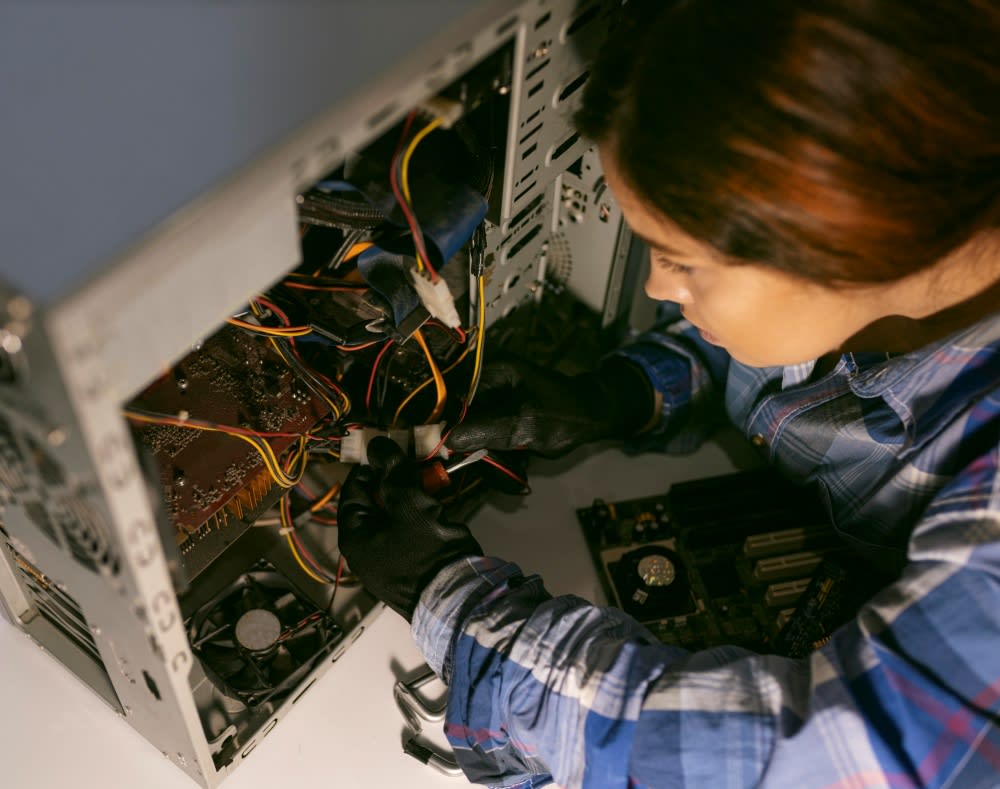- Published Mar 15, 2024
- Last Modified Mar 15, 2024
- 8 min
Top Considerations for Choosing the Right Industrial PC for Your Business
Unlock the power of industrial PCs for seamless operations. Explore key considerations for choosing the right one for your business in the Philippines.


There is no doubt that the industrial sector in the Philippines is experiencing a remarkable transformation, marked by significant advancements in innovation and technology. This is backed by the fact that the country was 56th in the Global Innovation Index (GII) 2023.
This leap underscores its position as an outperformer in innovation, especially when considering its level of economic development. This progress is mirrored in its industrial production growth, which, according to CEIC, saw a 2% year-on-year increase in December 2023.
Amidst this industrial growth, the adoption of new technologies, such as industrial computers (PCs), plays a pivotal role. In fact, the Philippine government's Digital Transformation Strategy aims to enhance digital infrastructure and connectivity, facilitating a more efficient business environment. This initiative is supported by efforts from the National Economic and Development Authority (NEDA) to leverage digital technologies for economic reforms and labor market improvements.
Industrial PCs, distinct from consumer-grade PCs, are instrumental in this technological integration, offering robust, reliable computing solutions tailored for the demanding environments of industrial applications.
So, how do you go about selecting the right industrial PC to ensure reliable operations? Their role in facilitating transformation in the Philippines' industrial sector, after all, cannot be overstated, making the selection of a suitable industrial PC a critical decision for businesses aiming to capitalize on the country's innovative momentum and digital infrastructure advancements.
What is an Industrial PC?

But first, what is an industrial PC?
Industrial computers serve as the backbone of modern industrial settings, catering to the stringent needs of sectors like manufacturing, logistics, and more.
And while many technical aspects are similar, such as microprocessor type, RAM, storage media, and interface ports, industrial PCs are not to be confused with consumer-grade PCs. This is mainly because an industrial PC is engineered for durability, featuring fanless designs to prevent dust ingress, ventless builds for harsh conditions far from typical office settings, and versatile input/output options. They also tend to boast reliability across varying temperatures, withstand physical and operational stress, and fulfill critical functions like process control and data acquisition.
Sure, this resilience is vital in industries requiring uninterrupted operation and unwavering dependability. However, with the rapid speed at which digitalization is occurring, emphasis is now being placed on the need for robust hardware, especially in extreme settings. IT failures in such environments not only disrupt operations but also jeopardize a company’s financial stability. As such, with the growing interconnectedness of systems, the importance of durable and dependable industrial PCs cannot be overstated.
So, what factors influence the choice of an industrial computer?
1. Performance
At the core of every industrial PC lies its CPU, driving its performance and operational capabilities. Thus, when it comes to the selection of a processor, it is not simply just about technical specifications; it's about ensuring it can handle your workload.
For example, an underpowered CPU might reduce initial costs, but the risk of sluggish performance and potential downtime could hinder productivity in the long run, ultimately affecting your bottom line.
Conversely, investing in an overpowered CPU could mean allocating resources to unneeded performance, leading to inefficiencies in budget allocation.
The challenge, then, is to strike a balance—choosing a processor that delivers steady, uninterrupted workflow without exceeding necessary capabilities.
To find the right processor, consider your industrial PC's primary applications. Evaluate the complexity of tasks, the data processing requirements, and future scalability. Consulting with experts or utilizing benchmarking tools can also guide you in matching processor capabilities with your operational needs, ensuring you invest in a CPU that supports both current and future performance demands effectively.
2. Environment
In the dynamic and often challenging conditions found in the Philippines, selecting an industrial PC that seamlessly integrates with its environment is paramount. This is because deploying standard desktop PCs in such settings prone to extreme temperatures, shocks, vibrations, and debris can lead to rapid failure.
Specifically designed with ruggedness in mind, embedded industrial computers thrive in these conditions. Equipped to withstand temperature fluctuations, mechanical shocks, and dust, industrial PCs thrive in environments experiencing drastic temperature fluctuations, mechanical shocks, and pervasive dust and debris. Their robust construction, featuring fanless and cableless designs, ensures internal components remain protected, contributing to operational continuity and reliability.
Moreover, the choice of an industrial PC must consider the level of dust and liquid protection required, aligning with the specific challenges of the deployment site. This is especially so since almost 90 percent of local factories are facing issues related to workplace safety and conditions, as noted by a spokesperson of the Associated Labor Unions-TUCP, making the durability and adaptability of industrial computing solutions not just beneficial but also essential.
3. Application
Finding the ideal industrial PC for your enterprise requires a deep understanding of its intended applications.
Industrial computers play diverse roles, serving as workstations, human-machine interfaces (HMIs) in manufacturing, and supporting operations in sectors like food processing and healthcare. Therefore, the selection process should match the PC's capabilities with the complexity and volume of tasks it will manage. This is especially so since, as software demands grow and applications expand, the need for enhanced computing power becomes paramount to ensure seamless and reliable performance.
4. Connectivity
Robust connectivity ensures seamless communication between an industrial PC and other components within a network, facilitating data exchange, process control, and monitoring across various platforms. Modern industrial PCs offer an array of connectivity options to cater to this need, including Bluetooth for wireless device communication, Wi-Fi 6 for high-speed, efficient wireless connectivity, 4G, 5G, and even 10 10GbE LAN ports.
When choosing an industrial PC, considering these connectivity options is crucial for ensuring that the system can support the desired level of integration and communication, thereby enhancing the efficiency and responsiveness of industrial operations.
5. Operating System
The right OS ensures seamless operation of applications, provides necessary security features, and supports the hardware components of the industrial PC. As such, compatibility with the intended industrial applications and peripheral devices is paramount, as mismatches can lead to operational inefficiencies or system vulnerabilities.
Moreover, the OS chosen must undergo rigorous testing for reliability and stability in industrial environments, which often present challenges not encountered in typical office settings. This testing ensures that the OS can handle the demands of continuous operation, manage data effectively, and maintain system integrity under various conditions.
6. Power
Power considerations are also pivotal when selecting a PC, especially in industrial settings, as they directly impact the efficiency and deployment flexibility of your operations. Assessing the power requirements of an industrial PC involves understanding its energy consumption under typical workloads and ensuring it aligns with the operational capabilities of your facility.
For instance, when it comes to applications that demand versatility in deployment, options such as DC power operation become invaluable. This feature allows industrial PCs to be easily integrated into environments where traditional AC power sources might not be readily available, such as remote or outdoor locations. Additionally, for industries relying on mobility, such as logistics or field services, industrial PCs with a vehicle power mode are essential. This mode ensures that PCs can draw power directly from a vehicle’s power system, allowing for seamless use in mobile applications without the need for constant recharging or external power sources.
7. Storage, Memory, and Expansion
In the domain of industrial computing, the setup of storage, memory, and expansion features significantly impacts system performance and adaptability.
This is because adequate storage ensures that large volumes of data generated in industrial settings can be securely saved, while sufficient RAM is essential for smooth multitasking and efficient process execution. The impact of RAM on system performance cannot be overstated; it directly influences the speed at which applications run, and data is processed, making it a key consideration for systems expected to handle complex tasks.
Moreover, the potential for system expansion is a crucial factor for businesses aiming to future-proof their operations. Industrial PCs with available expansion slots allow for the addition of extra memory, storage, or specialized cards to enhance connectivity or functionality. This flexibility ensures that the PC can adapt to evolving technological needs, extending its service life and maximizing the return on investment.
Elevate Industrial Performance with RS
RS stands at the forefront of supporting various industrial sectors, offering a comprehensive selection of industrial PCs and related equipment, such as power cables, tailored to meet the diverse needs of businesses. With our focus on reliability, efficiency, and innovation, we equip industries with the tools necessary for optimal performance.
Explore our offerings and partner with RS to drive your industrial operations forward.
Popular Industrial PC Brands
Phoenix Contact
Phoenix Contact, a renowned innovator in control and connection technologies, leads the charge toward sustainability with cutting-edge solutions for industrial digitalization and e-mobility.
Schneider Electric
Schneider Electric provides an array of products for Buildings, Infrastructure, Industries, and Data Centers, offering solutions for low-voltage electrical distribution and industrial automation.
Related links
- Industrial Computers
- Decoding Material Handling: Manual vs. Automated Approaches Unveiled
- Energy Management in Manufacturing Plants
- Prevent & Predict Next Steps
- A Complete Guide to Industrial Electrical Safety
- Why Choosing the Right Type of Cable Matters in the Age of IoT
- The Future of Automation – A Guide to What’s Next
- Safety Tips When Using Industrial Heating Elements